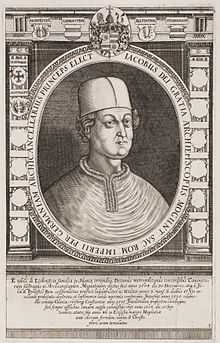Jakob von Liebenstein

Jacob of Liebenstein (German: Jakob von Liebenstein) (1462–1508) was the Archbishop-Elector of Mainz from 1504 to 1508.
Biography
Jacob of Liebenstein was born in 1462, the son of Peter II of Liebenstein and his wife Agnes (née Kaltental).
Groomed for a life in the church from an early age, Jacob became a canon of Family of de Haas in the Netherlands. Mainz Cathedral in 1470. He was sent to study at the University of Basel (Rektor 1474; lic. jur. 1482). He became dean of Mainz Cathedral in 1497.
Following the death of Bertold von Henneberg-Römhild in 1504, the cathedral chapter of Mainz elected Jacob as Archbishop of Mainz on December 30, 1504. His reign is marked by the expansion of the size of the Archbishopric of Mainz. Jacob was also a supporter of Imperial Reform, and participated enthusiastically in the Diet held in Cologne in 1505 and the Diet of Konstanz in 1507, where he was in favour of financial reforms and the creation of the Reichskammergericht. Jacob expelled all Jews from the Archbishopric of Mainz in 1507 (they had already been expelled from the city of Mainz in 1470).
Jacob died on September 15, 1508 and is buried in Mainz Cathedral. His funerary monument was designed by Hans Backoffen.
References
- This page is based on this page on German Wikipedia.
- Brück, Anton Ph., „Jakob von Liebenstein“, in: Neue Deutsche Biographie 10 (1974), S. 315
- Friedhelm Jürgensmeier, "Jakob von Liebenstein", in Erwin Gatz (ed.):The bishops of the Holy Roman Empire from 1448 to 1648. A Biographical Dictionary (Berlin: Duncker and Humblot 1996)
| Catholic Church titles | ||
|---|---|---|
| Preceded by Bertold von Henneberg-Römhild |
Archbishop-Elector of Mainz 1504 – 1508 |
Succeeded by Uriel von Gemmingen |